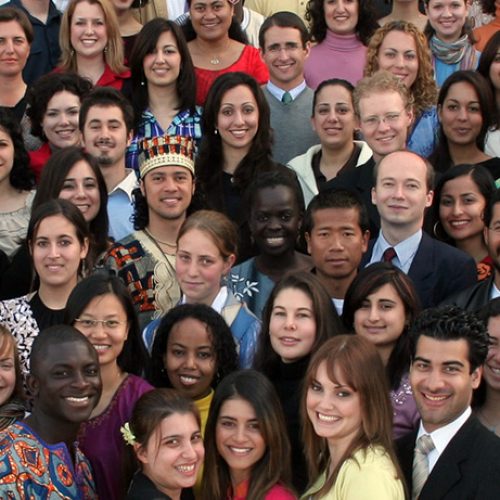Bahá’ís view development as a global enterprise whose purpose is to bring prosperity to all peoples, an enterprise that must pursue its aim in the context of an emerging world civilization. Humanity, the Bahá’í writings explain, is experiencing an age of transition best described as a passage from collective childhood to collective maturity. The revolutionary changes that are occurring with bewildering swiftness in every department of life assume their real meaning in this light. During this period, the barriers raised by the thoughts, attitudes, and habits of the childhood of humankind are gradually being uprooted, and the structures of a new civilization that can reflect the powers of adulthood are taking shape.
The hallmark of the age of maturity will be the unification of the human race, which, in turn, requires the establishment of the principles of justice. The current disparity between rich and poor cannot be permitted to persist. All of the earth’s inhabitants should be able to enjoy the fruits of a materially and spiritually prosperous global society. To create such a society, it is essential that people everywhere be empowered to participate in the constructive processes that will give rise to it. Building the capacity in individuals, communities, and institutions to contribute effectively to these processes is the primary task of development.
For the individual, this implies developing a number of interrelated capabilities— scientific, artistic, technical, social, moral, and spiritual. Individuals must be endowed with an understanding of concepts, knowledge of facts, and mastery of methods, as well as the skills, attitudes, and qualities required to lead a productive life. In terms of the community, capacity building entails fostering its development so that it can act as an environment conducive to the enrichment of culture. On the community rests the challenge of providing the milieu in which individual wills blend, in which powers are multiplied and manifest themselves in collective action, in which higher expressions of the human spirit can appear.
Beyond the training of individuals and the cultivation of community life, development strategies have to pay attention to the strengthening of organizational structures. Institutions are needed at every level of society that can act as channels through which the talents and energies of individuals and groups can be expressed in service to humanity. One of the accomplishments in which the Bahá’í community takes particular pride is the erection over its 165 years of existence— sometimes under the most adverse circumstances—of a structure of elected bodies that operate at the local, regional, national, and international levels. This collective hierarchy devolves decision making to the lowest level practicable—providing thereby a unique vehicle for grassroots action— while at the same time conferring a level of coordination and authority that makes possible cooperation on a global scale. Bahá’í development efforts throughout the world benefit from the guidance and support supplied by this administrative order.
Building the capacity of the world’s peoples and their institutions to participate effectively in weaving the fabric of a prosperous civilization requires a vast increase in their access to knowledge. Given that such a civilization will have to be cognizant of both the material and spiritual dimensions of existence, development theory and practice must draw on the two basic knowledge systems that have propelled humanity’s progress over the centuries: science and religion. Through these two agencies, the race’s experience has been organized, its environment interpreted, its latent powers explored, and its moral and intellectual life disciplined. Together, they have acted as the real progenitors of civilization.
Bahá’ís reject the notion that there is an inherent conflict between science and religion, a notion that became prevalent in intellectual discourse at a time when the very conception of each system was far from adequate. The harmony of science and religion is one of the fundamental principles of the Bahá’í Faith, which teaches that religion, without science, soon degenerates into superstition and fanaticism, while science without religion becomes merely the instrument of crude materialism. “Religion,” according to the Faith’s writings, “is the outer expression of the divine reality. Therefore, it must be living, vitalized, moving, and progressive.” “Science is the first emanation from God toward man. All created beings embody the potentiality of material perfection, but the power of intellectual investigation and scientific acquisition is a higher virtue specialized to man alone. Other beings and organisms are deprived of this potentiality and attainment.”
A cursory survey of the historical forces that are shaping the structure of society should convince even the most avid defenders of today’s global policies that unchecked material progress will never lead to true prosperity. From the heart of the great masses of humanity a dual cry can be heard. While it calls for the extension of the fruits of material progress to all peoples, its appeal for the values of spiritual civilization is no less urgent. For material civilization is “like a lamp-glass. Divine civilization is the lamp itself and the glass without the light is dark. Material civilization is like the body. No matter how infinitely graceful, elegant, and beautiful it may be, it is dead. Divine civilization is like the spirit, and the body gets its life from the spirit….”






